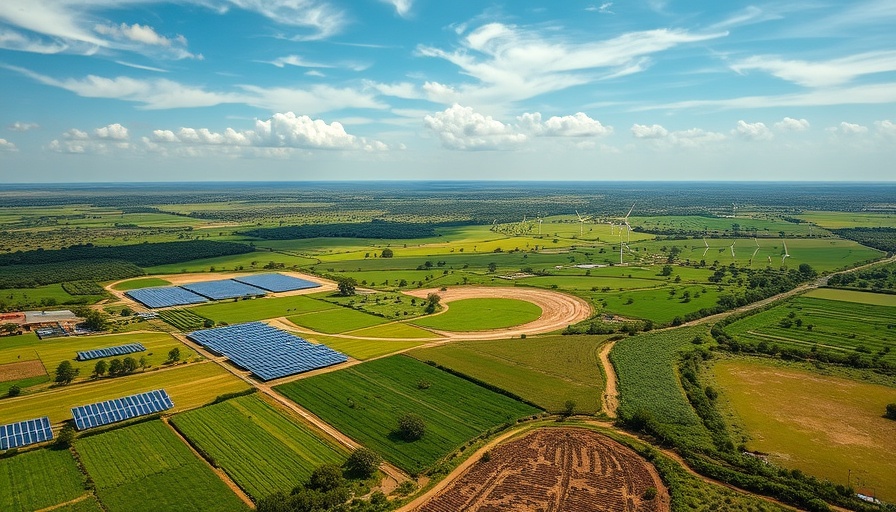
The Immediate Need for Science-Based Climate Solutions in Southern Africa
Southern Africa is at the precipice of a climate crisis that can no longer be ignored. As climate change impacts escalate dramatically, the calls from regional leaders emphasize the urgent need for science-based and adaptive solutions. This focus on scientific evidence comes to the forefront during crucial climate workshops like the recent one hosted by the Southern Africa Science Service Center for Climate Change and Adaptive Land Management (SASSCAL) in Windhoek, Namibia.
Challenges Facing the Region
Namibia's Deputy Minister of Agriculture, Ruthy Masake, outlined alarming scenarios underscoring escalating climate variability. Severe droughts, substantial floods, and pest outbreaks have disrupted agricultural stability. A State of Emergency was declared last year due to prolonged droughts that caused not only crop failures but also significant water shortages. Masake further noted recent flooding in several regions and locust invasions that jeopardized food security, highlighting the multifaceted nature of climate challenges.
Leveraging Technology for Climate Resilience
To bolster resilience against these threats, Namibia is increasingly looking towards scientific research. SASSCAL supports guided climate adaptation policies that are critical for making informed decisions. This initiative is not solely limited to Namibia; it also involves collaboration with neighboring nations like Angola, Botswana, South Africa, and Zambia. By strengthening regional partnerships, they aim to enhance agricultural sustainability and water management practices important for all partners involved.
Investments in Monitoring Systems
Significant investments are being made to upgrade monitoring capabilities. With 44 automated weather stations set for modernization under a €2.9 million investment plan, Namibia is positioning itself to use advanced data and analytics effectively. These improvements in climate monitoring are crucial for predicting weather patterns more accurately, which can lead to better preparedness and response frameworks.
Harnessing Renewable Energy for Sustainable Development
In a groundbreaking step, Namibia launched Africa's first Green Hydrogen Village in the Erongo Region, showcasing an initiative that combines innovative technology with environmental sustainability. This project, backed by SASSCAL, reflects the government’s commitment to renewable energy solutions that reduce dependency on fossil fuels, in line with global movements towards cleaner energy sources. Additionally, 34 scholarships have been awarded to Namibian students pursuing climate-related studies, emphasizing the integration of education and practical solutions in combating climate challenges.
Turning Research into Action
The thematic workshop serves as a vital intersection for researchers, policymakers, and regional partners to assess achievements in sustainability and adapt scientific findings into actionable policies. By fostering an environment of collaboration, participants are encouraged to innovate and transform research insights into real-world applications that enhance food security, water management, and energy efficiency.
Future Predictions and Sustainable Pathways
The implications of these initiatives extend far beyond immediate climate mitigation. Participants in workshops like these often emphasize the necessity for tech-driven solutions. As nations across Southern Africa invest in digital technologies aligned with sustainability goals, the integration of AI and data analytics with climate policy will undoubtedly enhance decision-making processes. Future innovations will likely push jurisdictions towards more resilient and adaptive governance structures, prepared to tackle the unrelenting impacts of climate change.
The Call for Collaborative Solutions
As climate volatility intensifies, Southern African leaders stress the importance of collaboration between nations. The concept of shared challenges requires collective approaches, merging technology and policy-driven solutions effectively. By engaging in proactive research and crystalizing advancements into actionable items, stakeholders can create a roadmap for sustainable development that not only benefits individual nations but also the region collectively.
In closing, as Southern Africa faces significant climate-related threats, the collaboration between science-based solutions, renewable energy initiatives, and enhanced monitoring capabilities marks a pivotal point in the region's climate resilience efforts. The integration of technology, such as advanced data analytics and AI, could further empower sustainability efforts. Decision-makers and stakeholders must act promptly to ensure a comprehensive response to climate crises, securing the future for their populations.
 Add Row
Add Row  Add
Add 




Write A Comment